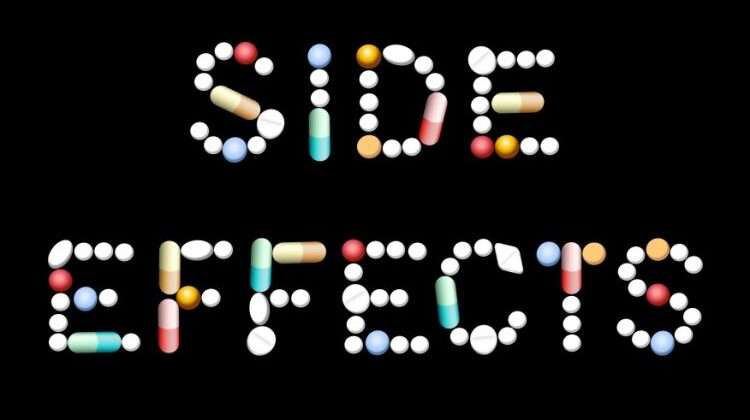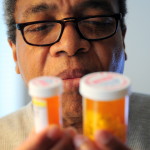When a drug has harmed someone, they have had an adverse drug event(1) (Drug Side Effect). An adverse drug event is any undesirable experience associated with the use of a medical product in a patient. Drug side effects are an important health issue in the United States. Drug side effects cause over 700,000 emergency department visits(2) each year. Nearly 120,000 patients each year(3) need to be hospitalized for further treatment after emergency room visits for adverse drug events.
To reduce the risk of harm from Side Effects, Adults should:
- Keep a list of their medicines
- Follow directions
- Ask questions
- Keep up with all blood tests and results recommended by your doctor
- Take pain relievers and antibiotics only as directed
Know the Benefits and Risks of Your Medications
All medicines have benefits and risks. The risks of medicines are the chance that something unwanted or unexpected could happen to you when you use them. Risks could be less dangerous things,
such as an upset stomach, constipation, drowsiness or diarrhea. Risks that are more serious, such as liver damage, breathing, and behavioral problems can occur. The Food and Drug Administration (FDA) approves a drug for marketing after determining that the drug’s benefits outweigh its risks.
Drug information sheets are supplied when a prescription drug is dispensed in the United States. The drug information sheets provide basic information such as drug name and description, warnings, uses, how to use the medication, and side effects. Additional information can also be found at Medline Plus(4), a service of the U.S. National Library of Medicine(5).
Medline Plus talks about drug interactions, which may occur between:
- Two drugs, such as aspirin and blood thinners
- Drugs and food, such as statins and grapefruit
- Drugs and supplements, such as gingko and blood thinners
- Drugs and diseases, such as aspirin and peptic ulcers
A Few Drugs Cause over 40% of Emergency Visits
Some medicines need blood testing to help make sure the dose is just right for you. Over 40% of emergency visits that require patients to be hospitalized are caused by just a few of these medicines that require regular monitoring with blood tests(6). These drugs treat life-threatening conditions such as blood clots, diabetes, and seizures. They offer significant benefits to patients, but there are risks.
Common drugs that can require monitoring include:
- Blood thinners (e.g., warfarin(7))
- Diabetes medicines (e.g., insulin(8))
- Seizure medicines (e.g., phenytoin(9), carbamazepine(10))
- Heart medicine (e.g., digoxin(11))
The numbers of Adverse Drug Events (Side Effects) will likely grow due to:
- Development of new medications
- Discovery of new uses for older medications
- Aging American Population
- Increase in the use of medications for disease prevention
- Increased coverage for prescription medications
Medicines are one of mankind’s greatest inventions. They cure, prevent and alleviate pain and suffering for millions of people every day. Medicines play a significant role in a Wellness program, which includes physical, mental and nutritional aspects. Drug medications have improved the quality of life and increased life expectancy. But you must educate yourself about their benefits and risks.
Click this link to get free Health and Wealth information to improve your life. Play the free “Slow Roll Through Civil Rights” Game found on the Jay Harold website. Enjoyed this post? Share it and read more here.

Bibliography
- http://www.fda.gov/Safety/MedWatch/HowToReport/ucm053087.htm
- http://www.cdc.gov/MedicationSafety/Adult_AdverseDrugEvents.html
- http://www.cdc.gov/medicationsafety/basics.html
- https://www.nlm.nih.gov/medlineplus/
- https://www.nlm.nih.gov/
- http://www.cdc.gov/MedicationSafety/Adult_AdverseDrugEvents.html
- https://www.nlm.nih.gov/medlineplus/druginfo/meds/a682277.html
- https://www.nlm.nih.gov/medlineplus/druginfo/meds/a682611.html
- https://www.nlm.nih.gov/medlineplus/druginfo/meds/a682022.html
- https://www.nlm.nih.gov/medlineplus/druginfo/meds/a682237.html
- https://www.nlm.nih.gov/medlineplus/druginfo/meds/a682301.html






